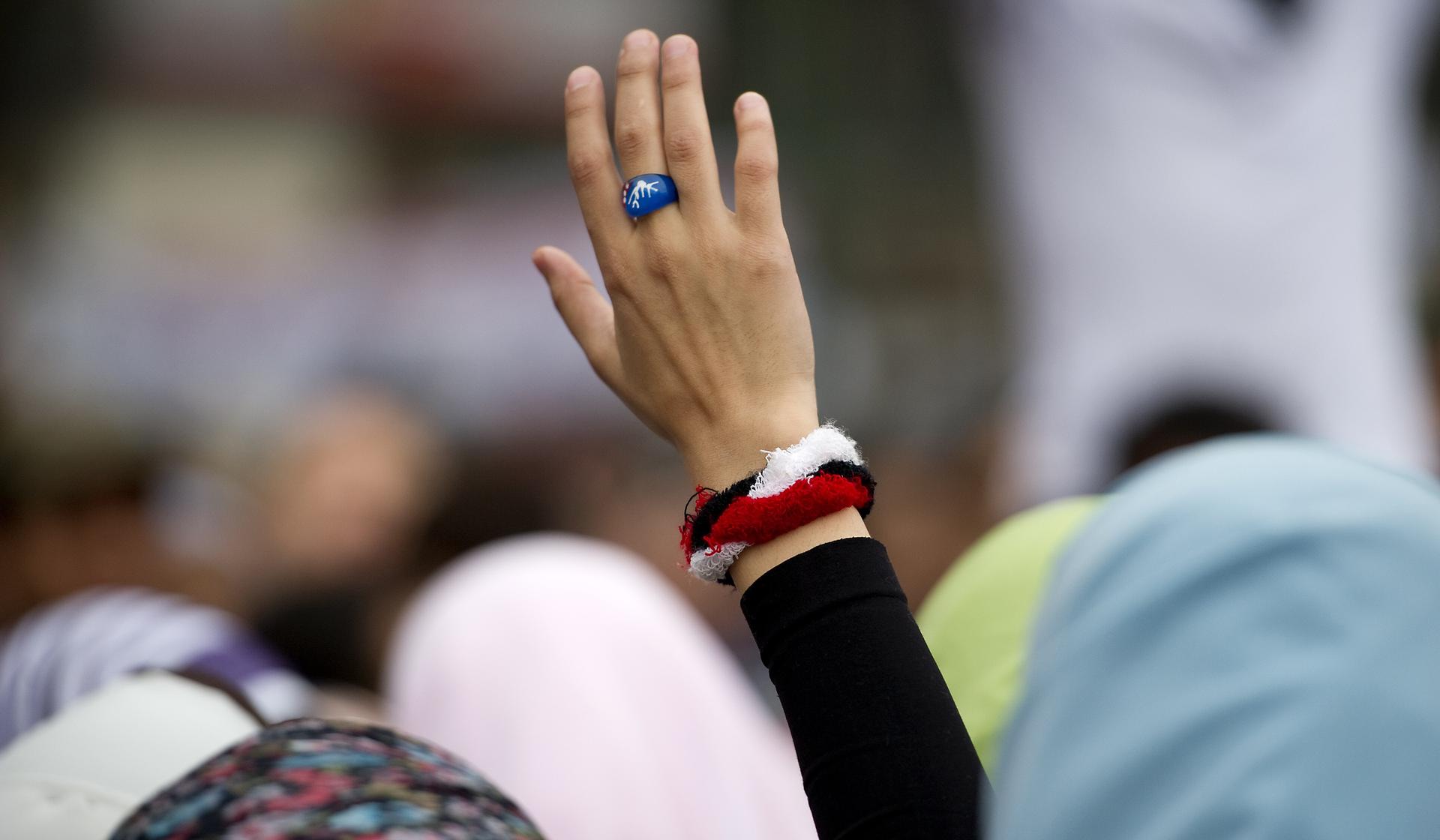Sexual violence emerges as ‘fourth enemy’ in Tahrir
An Egyptian protester wearing an armband with the colors of her national flag raises her hand during a demonstration calling for the interim military rulers to step down in Tahrir Square in Cairo on November 27, 2011.
Violence in the air in Tahrir Square in the days leading up the election seems to be uniquely menacing for female journalists.
Two prominent female journalists — one French and one Egyptian — were attacked last week, sending a chill through the reporting ranks and prompting many news organizations and media advocacy groups to reevaluate whether it is safe to send women into Tahrir Square to cover the story.
The two attacks are not isolated. In February, CBS News correspondent Lara Logan was the victim of a sustained sexual assault in Tahrir Square and delivered a powerful and emotional interview with “60 Minutes” about the ordeal she suffered. Through several reporting trips to Cairo this year, many female colleagues have told me that they have been threatened or harassed frequently in the square.
Several female protesters have also described sexual assault at the hands of security forces and what they described as infiltrators into the square. Two women interviewed by GlobalPost said the military’s use of “virginity tests” in the processing of female protesters were tantamount to rape and one woman has taken her claim to court in filing a case against the military.
French journalist Caroline Sinz said she was separated from the cameraman with whom she works and told AFP Sunday that she was beaten and molested by a crowd of Egyptian boys and young men in a way that she said “would be considered rape.”
Mona Eltahawy, a prominent Egyptian journalist and on-line activist, said she was repeatedly harassed by men in the square last week. On Wednesday amid the tumult of the demonstrations that rocked downtown Cairo, she was taken into custody by security forces who she said beat her with their batons, verbally used her and sexually assaulted her.
Her left arm and right hand were broken in the assault by Egyptian security forces and she tweeted a picture of herself in two casts.
For Eltahawy the violence against women reveals the need for Egypt to think about fundamental change in society and the way women are treated.
In an interview with National Public Radio, Eltahawy said, “We are also fighting what I call the “fourth enemy” now. It’s not just counter-revolution, it’s not just tear gas, it’s not just police brutality — it’s sexual violence.”
Eltahawy added, “We are experiencing a political revolution in Egypt, but we need a cultural and social revolution. Tahrir now has become this cauldron of problems in Egypt that we must start fixing now. That’s why Tahrir is so important. Tahrir is not a square … Tahrir is a state of mind. Tahrir is a symbol — and not just for Egypt, for the entire world.”
And Tahrir is also a place where news organizations will have to take all of the steps they can to be sure their reporters are working safely. GlobalPost and the New York-based non-profit organization Open Hands Initiative recently sponsored a reporting fellowship with 16 top, young Egyptian and American journalists, the majority of whom were women.
As part of the fellowship, GlobalPost offered daily training seminars to all of the reporters on how to increase their ‘situational awareness’ and how to operate safely. We hope the lessons were useful — for men and women alike — and that they might help reporters do their jobs safely.
But there is a larger issue that no amount of training or ‘situational awareness’ can change. That is, a need to change the way Egyptian society — from the crowds in Tahrir to the security forces on the street — views women. Here we take Eltahawy’s call to heart for another, perhaps more profound kind of uprising to take place in Egypt, one that is squarely against sexual violence.
Every day, reporters and producers at The World are hard at work bringing you human-centered news from across the globe. But we can’t do it without you. We need your support to ensure we can continue this work for another year.
Make a gift today, and you’ll help us unlock a matching gift of $67,000!
